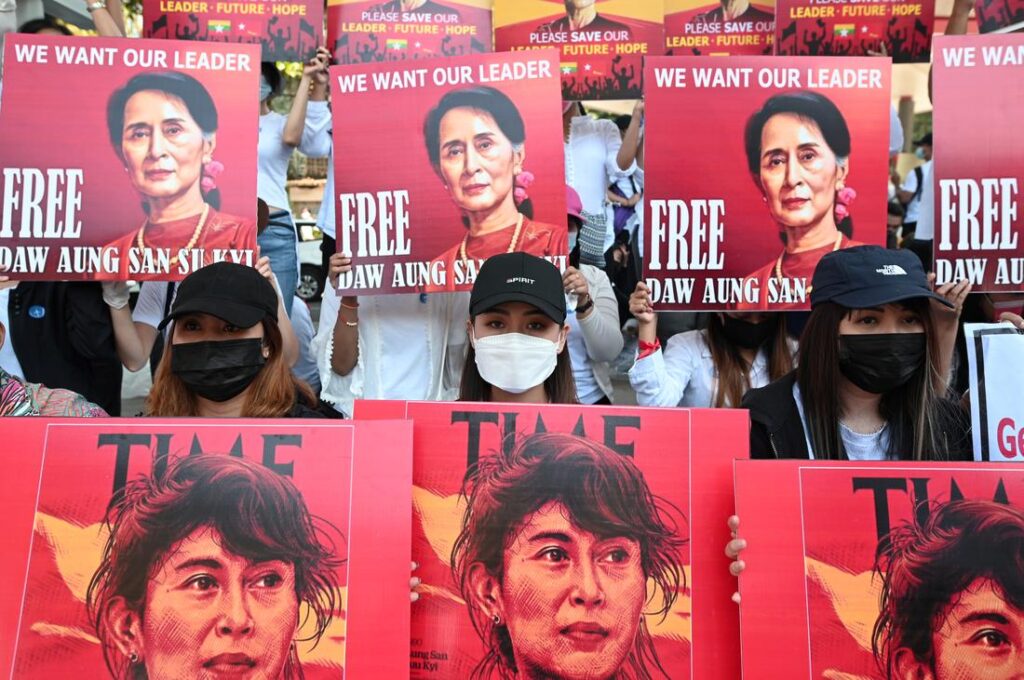Suu Kyi’s Reduced Sentence Is A Hollow Move By A Failing State
Aug 18, 2023 | Pratirodh Bureau
FILE PHOTO: Protesters in Myanmar have kept up demands for the release of ousted civilian leader Aung San Suu Kyi and an end to military rule
In a general amnesty announced on military television last week, Myanmar’s military junta removed six years from the jail term of Aung San Suu Kyi, the 78-year-old leader of the government removed by a coup in February 2021. This came a week after the junta moved her into house arrest following a year in solitary confinement.
But it still leaves Aung San Suu Kyi facing a 27-year jail term on bogus charges.
The junta also lopped four years off former president Win Myint’s sentence, and reportedly released more than 7,000 other prisoners.
But we shouldn’t be persuaded that the junta has changed its stripes. It regularly uses mass amnesties in attempts to cultivate goodwill, either at home or abroad. But any major figures released in these amnesties shouldn’t have been locked up in the first place.
The day before the amnesty, the junta extended its state of emergency for a fourth time, further delaying elections, due to relentless opposition to its February 2021 coup.
The coup sparked ongoing and widespread violence, and shredded the military’s last claims to social esteem. This has left Myanmar impoverished, largely friendless, and without any clear plan for a positive future.
Determined Resistance
The army’s top decision-makers, currently bunkered in the capital, Naypyidaw, struggle to maintain control of enough territory to seriously contemplate even a heavily stage-managed nationwide poll.
Under these volatile conditions, people have been voting with their feet by fleeing abroad or taking up arms in a revolutionary mobilisation.
The junta’s leader, Senior General Min Aung Hlaing, reportedly told the National Defence and Security Council that elections couldn’t be conducted due to continued fighting in several regions.
The reality for the generals in their fortified compounds is that any poll could further embarrass them – they cannot even reliably rig the national vote.
Many areas are off-limits to government forces, perhaps as much as half the country – which is Southeast Asia’s second-largest by land area. While aerial bombardments by regime aircraft might set back the resistance, the strategy is hardly a way to win hearts or minds. Inch by inch, the diminution of central government control raises questions about the country’s future.
There’s increasing concern across the Southeast Asian region. An intractable civil conflict presents significant challenges for neighbours Thailand, China, India and Bangladesh.
Diplomatic efforts to maintain Myanmar’s territorial integrity jostle with the discomfort felt almost everywhere about doing business with a blood-splattered regime.
The regime tries to play the politics of the Association of Southeast Asian Nations (ASEAN) to its advantage. But even there, sometimes in the company of other autocrats, Myanmar now faces the ignominy of an “empty seat” at the political level. And almost nobody wants to shake hands with regime representatives.
An Unnecessary Crisis
It’s a precipitous erosion of what was, until the coup, a relatively positive story for most Myanmar people.
Before the coup, the most problematic issue was the military’s abuses of the Rohingya, a Muslim ethnic minority living in westernmost Myanmar.
Other issues – such as longstanding ethnic grievances and yawning economic inequality – were, at the very least, subject to open debate in the media and sometimes in the country’s 16 regional and national legislatures.
That political and social infrastructure, and the emerging civil society it helped sustain, has now crumbled. It’s been replaced by violence, mistrust, terror and martial chauvinism.
Myanmar’s young talent now banned from universities, bravely disobedient in the faces of tanks and bullets, face dismal options: the mountains, the jungle, the border. Some lie low. Others still seek to fan the revolutionary spark. Many are now in jail, others dead.
The military, of course, blames its opponents for the devastation its coup unleashed. That sad fact hides a tremendous political and cultural miscalculation.
It’s unclear whether Myanmar can recover from the army’s self-inflicted wounds. Some speculate the whole system will collapse, making it impossible for powerbrokers to keep up the increasingly flimsy charade of state power. It has all the ingredients of a failed state.
No Way Out
The decision to abandon the proposed elections, followed by last week’s amnesty, is hardly a surprise. But it does reveal the fragility of the military system and the paranoia of the men in charge.
It’s also further evidence that nobody can trust the junta. Not only has it broken the faith of the Myanmar people, it constantly tests the patience of foreign governments, even those that offer some sympathy for its self-sabotage.
With Aung San Suu Kyi and other senior members of the democratically elected government still locked up, the reality facing the generals is they will never beat her at any election. They are still betting that eventually the world – and, most importantly, their near neighbours – will lose interest and allow some type of partial rehabilitation. Maintaining links with China and Russia is a key strategy.
Still, there’s no obvious path to fuller inclusion in ASEAN while the generals unleash such violence against their own people.
The extension of the state of emergency and postponement of hypothetical elections will further invigorate resistance forces hoping to steadily weaken the army’s grip on power.
A pointless reduction in the jail sentences for Myanmar’s democratically elected leaders is unlikely to quell the fires of opposition now burning across the country.
(This article is republished from The Conversation under a Creative Commons license. Read the original article)
